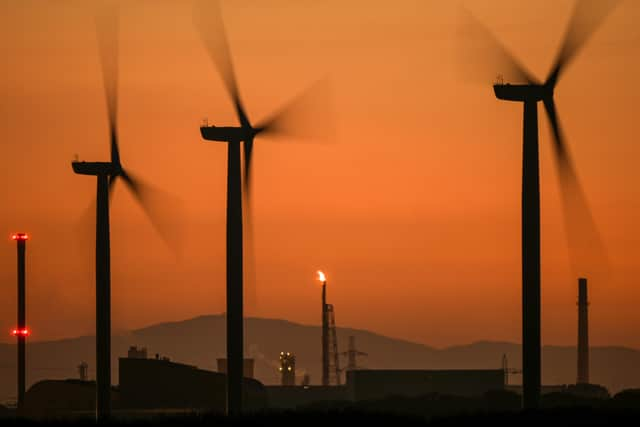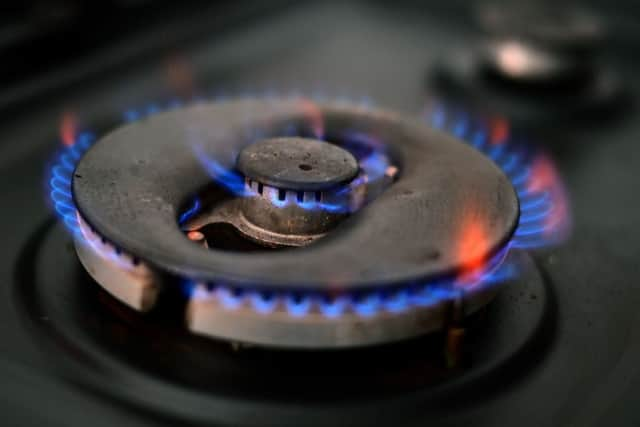Bulb Energy: UK Government accelerates planning for energy supplier’s possible collapse
This article contains affiliate links. We may earn a small commission on items purchased through this article, but that does not affect our editorial judgement.
and live on Freeview channel 276
The UK Government has accelerated contingency planning amid fears Bulb Energy could become the latest energy supplier to go bust.
As first revealed by Sky News, ministers, officials and the energy industry regulator Ofgem believe the company could collapse as early as next week.
Advertisement
Hide AdAdvertisement
Hide AdShould it do so, it would be the biggest collapse seen during the energy crisis so far - a period which has already claimed the scalps of 14 suppliers.
Bulb is the seventh largest domestic energy supplier in Britain, providing around 1.7 million households with electricity and gas.
Searching for a buyer
Industry sources told Sky News on Friday (29 October) that negotiations were underway with a small number of potential buyers.
However, some potential suitors had pulled out of the talks in recent days.
Advertisement
Hide AdAdvertisement
Hide AdA solvent rescue remained possible, the sources told Sky, but what was certain was that Bulb would be highly unlikely to survive through November without more money.
Ovo Energy, Octopus Energy, and Shell Energy Retail are among Bulb’s competitors that have been able to access its financial records in recent weeks.
An executive from one of the companies which had explored taking over Bulb said it had liabilities of around £600m, making a solvent takeover of the firm hard to envisage.
This despondency was reflective of the current backdrop of wholesale price volatility.
Advertisement
Hide AdAdvertisement
Hide AdA significant surge in wholesale gas costs brought on by a high global demand has come at a time when supply has been reduced.


This has been exacerbated by the energy price cap - a limit on what energy firms can charge their customers in a year - that has seen many companies shoulder extra financial strain in recent weeks.
"Our discussions with multiple parties to secure additional funding continue to make good progress and we’re encouraged by the drop in wholesale energy prices,” a Bulb spokesperson said on Friday 29 October.
"We expect the government to monitor wholesale prices and their effect on the whole industry, but ministers and Ofgem have been clear we must emerge from the energy crisis with a competitive and innovative market, rather than a return to the oligopoly of the past."
What could the Government do?
Advertisement
Hide AdAdvertisement
Hide AdIf the hunt for a buyer proves unsuccessful, the Department for Business, Energy and Industrial Strategy (BEIS), as well as regulator Ofgem, would initially consider whether Bulb can be dealt with through the watchdog’s Supplier of Last Resort (SOLR) process.
Under SOLR, when a supplier goes bust Ofgem appoints a new company to take over its customers.
This gives customers certainty that they can continue to use their gas and electricity as usual.
But the SOLR system is often an expensive process for the new supplier.
Advertisement
Hide AdAdvertisement
Hide AdAnd Bulb is also potentially too big for any single supplier to currently take on through the scheme.


In a letter from Ofgem to the industry on Friday (29 October), the regulator said it would aim to reform this process by speeding up expenses payments volunteer firms can claim if they take on another supplier’s customer base.
Currently, in order to incentivise companies to volunteer, Ofgem allows them to claim back some of these expenses from the rest of the industry – a cost that is ultimately passed on to all bill-payers in Britain.
Should SOLR fail to provide a solution, a resolution process called the Special Administration Regime (SAR) could be used for the first time.
Advertisement
Hide AdAdvertisement
Hide AdThis process would guarantee funding for Bulb from the Treasury while administrators seek a restructuring deal, buyer, or transfer of the customer base.
Under the SAR, the administrator has a legal duty to consider the interest of customers, unlike a conventional insolvency process where the primary duty is to creditors.
Business Secretary Kwasi Kwarteng has previously said taxpayer money would not be used to bail out struggling energy suppliers, although he did say the Government would offer some support to viable companies.
“Loans is a solution we are looking at, but what I am keen to stress is that these won’t be grants these are not simply handouts. Nor should we bail out all the companies or energy suppliers because a number of them have been badly run,” Mr Kwarteng said.
What is Ofgem considering?
Advertisement
Hide AdAdvertisement
Hide AdOn Friday (29 October), it was also announced that Ofgem was considering changing the way the energy price cap works - although any changes could come too late for Bulb Energy.
Ofgem has given no details of what adjustments it might make to how the cap is calculated, but will set out its thinking as it launches a consultation next month.
At the moment the regulator caps the energy bills of more than 14 million households at £1,277 per year on average.
But the spike in the price of gas has happened so rapidly that suppliers are now having to pay more for energy than the cap forces them to sell it for.
Advertisement
Hide AdAdvertisement
Hide AdOfgem said in a letter to suppliers on Friday: “The unprecedented rise in energy prices this year has changed the perception of risk and uncertainty in this market.
“In order to protect the interests of consumers, we must ensure that the regulatory frameworks, including the price cap, fully reflect the costs, risks and uncertainties facing the supply companies we regulate.”
The consultation on potential changes will end in February, and they could be implemented at the beginning of April, when the price cap is set to change.
In its letter, Ofgem also said it intends to raise the bar for what it expects from suppliers’ risk management processes and potentially change conditions in their licences.
Additional reporting by PA
A message from the editor:
Advertisement
Hide AdAdvertisement
Hide AdThank you for reading. NationalWorld is a new national news brand, produced by a team of journalists, editors, video producers and designers who live and work across the UK. Find out more about who’s who in the team, and our editorial values. We want to start a community among our readers, so please follow us on Facebook, Twitter and Instagram, and keep the conversation going. You can also sign up to our email newsletters and get a curated selection of our best reads to your inbox every day.
Comment Guidelines
National World encourages reader discussion on our stories. User feedback, insights and back-and-forth exchanges add a rich layer of context to reporting. Please review our Community Guidelines before commenting.